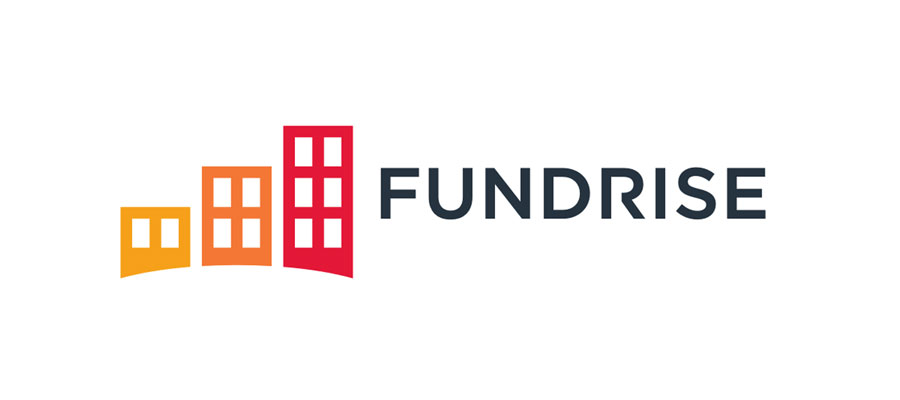Real estate crowdfunding makes it possible to invest in property without buying or managing it yourself. With lower minimums, these platforms let you join projects that were once limited to institutions or wealthy investors.
In 2026, many platforms have updated fees, features, and return expectations. This guide highlights the best options, compares their strengths, and answers common questions so you can choose the right fit for your investment goals.
Top 7 Real Estate Crowdfunding Sites for 2026
Choosing a platform depends on your budget, investor status, and whether you prefer passive funds or individual deals. The table below gives a snapshot of what each company offers before we look at them one by one.
1. Fundrise
Fundrise is one of the best-known platforms and appeals to new investors. You can start with as little as $10 and invest in managed funds that hold residential and commercial projects.
Pros:
- Low minimum makes it accessible
- Automatic diversification across multiple properties
- Open to non-accredited investors
Cons:
- Limited liquidity compared to stocks
- No choice of individual deals
2. EquityMultiple
EquityMultiple serves accredited investors with a mix of debt, equity, and fund options. It provides flexibility for investors who want different risk-return profiles.
Pros:
- Diverse offerings across debt and equity
- Transparent deal breakdowns
- Potential for strong returns
Cons:
- Higher fees than some platforms
- Limited liquidity
3. Willow Wealth

Willow Wealth is broader than just real estate, with offerings that include art, private credit, and structured notes. Its platform is built for accredited investors looking for diversification.
Pros:
- Wide mix of alternative assets
- Access to real estate and beyond
- User-friendly platform
Cons:
- Accredited investors only
- Fee structures can be complex
4. RealtyMogul
RealtyMogul gives investors a choice between REITs and direct deals. Minimums are higher, but it works for both accredited and non-accredited investors.
Pros:
- Access to both funds and individual properties
- Long track record in crowdfunding
- Lower entry point than some accredited-only platforms
Cons:
- Liquidity is limited
- Direct deals require more research by the investor
5. CrowdStreet
CrowdStreet caters to accredited investors who want direct access to large commercial projects. Minimum investments start at $25,000, but the upside can be significant.
Pros:
- Wide range of institutional-quality deals
- High potential returns
- Transparent deal information
Cons:
- Accredited investors only
- Illiquid until projects finish
6. DiversyFund
DiversyFund focuses on multifamily properties with a growth strategy. The platform reinvests earnings into acquiring new projects rather than paying early dividends.
Pros:
- Low $500 minimum
- Open to non-accredited investors
- Focus on long-term wealth building
Cons:
- No income distributions until exit
- Limited investment choices
7. Arrived
Arrived lets you buy shares in rental houses starting at just $100. It’s designed for everyday investors who want a landlord-style return without managing tenants.
Pros:
- Very low minimums
- Easy entry to rental home investing
- Open to non-accredited investors
Cons:
- Limited liquidity
- Still a newer platform compared to others
Comparison Table (At-a-Glance)
| Platform | Minimum Investment | Investor Eligibility | Types of Deals | Fees | Liquidity | Average Returns | Best For |
|---|---|---|---|---|---|---|---|
| Fundrise | $10 | Non-accredited | eREITs, eFunds | 1% management | Limited | 7–10% | Beginners wanting low entry point |
| EquityMultiple | $5,000 | Accredited | Debt, equity, funds | 0.5–1.5% + carry | Illiquid | 7–14% | Accredited investors seeking mix |
| Willow Wealth | $10,000 | Accredited | Real estate + alternatives | 1–2% + fund costs | Varies | 7–15% | Diversification beyond real estate |
| RealtyMogul | $5,000 | Both | REITs, individual projects | Varies by deal | Limited | 6–12% | Mix of funds and direct projects |
| CrowdStreet | $25,000 | Accredited | Individual commercial deals | Sponsor + platform | Illiquid | 12–20% | Accredited investors seeking scale |
| DiversyFund | $500 | Non-accredited | Multifamily funds | Built into fund | Long-term only | 10–18% | Growth-focused investors |
| Arrived Homes | $100 | Non-accredited | Fractional rental homes | 1% management | Limited | 5–12% | Investors wanting direct rentals |
What Is Real Estate Crowdfunding?
Real estate crowdfunding is a way to invest in property without buying a home or building yourself. Platforms pool money from many investors and use it to fund residential or commercial projects. This structure gives everyday investors access to deals that were once only available to institutions or wealthy individuals.
It’s different from a real estate investment trust (REIT), which is a publicly traded fund that owns and manages properties. Crowdfunding platforms often allow more direct investment into specific projects or private funds. Unlike traditional syndications, which usually require large amounts of capital and connections, crowdfunding platforms are open to a wider group of investors with lower minimums.
This type of investing works well for people who want exposure to real estate without the work of being a landlord. Some platforms are open to non-accredited investors, while others focus on accredited investors who meet income or net worth requirements.
How Real Estate Crowdfunding Works
Crowdfunding platforms make the process straightforward. While details vary by company, the basic steps usually follow this pattern:
- Choose a platform: Review investment options, minimums, and investor requirements.
- Open an account: Provide your information and link a funding source.
- Select properties or portfolios: Pick from individual deals or managed funds depending on the platform.
- Invest a minimum amount: Start with as little as $10 in some cases, though many platforms require $5,000 or more.
- Earn returns: Returns may come from rental income, interest payments, property appreciation, or a mix of these.

Key Factors to Consider Before Choosing a Platform
Not every real estate crowdfunding site works the same way. Before you commit money, compare these factors to see which platform fits your goals.
- Minimum investment: Some start as low as $10, while others require $25,000 or more.
- Investor eligibility: Check if the platform accepts non-accredited investors or only accredited investors.
- Liquidity: Understand how and when you can access your money. Many investments are long-term.
- Returns: Look at both historical performance and current projections.
- Fees: Watch for management fees, advisory costs, and sponsor fees that cut into profits.
- Risk and deal types: Decide whether you want equity, debt, or managed funds, and match that to your tolerance for risk.
Who Should Use Real Estate Crowdfunding Platforms?
Real estate crowdfunding is not one-size-fits-all. The right fit depends on how much you want to invest and how involved you want to be.
- Beginners with smaller budgets: Platforms like Fundrise or Arrived Homes are accessible starting under $100.
- Accredited investors seeking higher returns: Sites such as CrowdStreet and EquityMultiple focus on larger projects with higher yield potential.
- Hands-off investors: If you want passive income and no property management, managed funds are the best option.
Risks of Real Estate Crowdfunding
Every investment carries risk, and crowdfunding platforms are no exception. Knowing the potential downsides helps you prepare.
- Illiquidity: Most investments are locked up for years with no easy exit.
- Platform risk: If the company behind the platform fails, your investment could be affected.
- Market cycles: Property values and rental income can fall during downturns.
- How to reduce risk: Spread money across multiple projects, research deal sponsors, and avoid putting too much into a single property.
How to Start Investing in Real Estate Crowdfunding
Getting started is straightforward. Follow these steps to put your first dollars to work.
- Define your goals: Decide if you want steady income, long-term growth, or both.
- Check your eligibility: Know whether you qualify as an accredited investor.
- Compare platforms: Review features, fees, and returns using the comparison table above.
- Start with the minimum investment: Begin small and add more once you’re comfortable.
- Monitor and diversify: Track performance and spread your money across different types of deals.
Final Thoughts
Real estate crowdfunding has opened the door for investors who want access to property without the responsibility of direct ownership. Whether you’re starting with $10 or you’re an accredited investor with more capital to put to work, there’s a platform that fits.
Fundrise and Arrived Homes keep entry costs low, while CrowdStreet and EquityMultiple focus on larger deals with higher upside. Platforms like RealtyMogul, Willow Wealth, and DiversyFund sit in between, offering options that balance growth, income, and diversification.
The best choice depends on your budget, goals, and comfort with risk. Start small, compare features carefully, and build a strategy that works for your long-term wealth.
Frequently Asked Questions
How much can I realistically earn from real estate crowdfunding?
Returns vary by platform and project. Some funds target 6–10% annually, while higher-risk deals may project 12% or more. Keep in mind that results are not guaranteed and depend on property performance and market conditions.
Do real estate crowdfunding platforms pay dividends monthly or quarterly?
Most platforms pay quarterly, but some distribute monthly income depending on the type of investment. Equity-based projects often pay at the end of the investment term, while debt-based deals may provide more regular income.
Can I use retirement accounts to invest in real estate crowdfunding?
Yes, many platforms allow investments through self-directed IRAs. This lets you grow returns tax-advantaged, but setup can take extra steps compared to using a regular account.
Are real estate crowdfunding investments insured like bank accounts?
No, these investments are not FDIC-insured. They carry real estate market risk, which means you could lose money if a project underperforms or fails.
How do taxes work with real estate crowdfunding?
Most investors receive a Form K-1 or 1099 from the platform. Income may be taxed as ordinary income, capital gains, or a mix depending on the structure of the deal. It’s best to review tax documents each year and consult a professional if you’re unsure.










